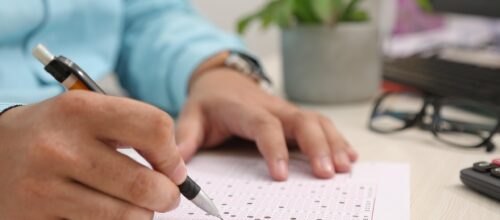Teaching Students to Fish: Problem Roulette Empowers Online Students to Become Self-Sufficient Learners

Echoes of “Can we have a study guide?” still reverberate through the virtual classrooms, even as summer takes hold and the allure of relaxation sets in. Study guides offer a temporary solution to students’ hunger for knowledge, providing them with the fish they need to satisfy their immediate needs. This approach, however, creates a cycle of dependency, requiring another fix before the next test opens. This is not the way. Instead of spoon-feeding, students should be taught to fish.
Though study guides have their merits, their direct impact on learning is not always evident. Tests can be a significant source of stress for students, which in turn hampers their performance. Study guides can help alleviate this anxiety and improve exam scores (Dickson, Miller, & Devoley, 2005), but they don’t necessarily foster deep, long-term learning. If the goal is to guide students’ online study habits before a test, then they should receive guidance not only on what to study but also on how to study effectively.
Problem Roulette is the Way
Problem Roulette is an invaluable personalized online learning tool that directs students’ attention to the study skills that work best for them. It offers a collection of previous test items for students to practice with and, starting this Fall 2023, will begin providing tailored study tips based on proven theory and algorithms designed to enhance test performance. In essence, Problem Roulette will not only feed but also teach students to fish. It will give them the confidence boost they crave through exposure to test-like items, while teaching them personally relevant study skills that can be applied to new situations.
How will Problem Roulette work in online learning environments? In short, it will harness the power of gameful learning. As students engage with practice test items, the system will collect statistics on their performance, which will then be visualized and presented on a student-facing dashboard. This feedback will include information on the number of problems completed and the number of consecutive correct answers. These metrics will be compared with predefined volume and streak goals established through previous research (Black et al., 2023), known to maximize course performance. Consequently, the game for students becomes achieving their target volume and streak goals, which intrinsically incentivizes their study. To attain these goals, however, they must study effectively by consistently answering questions correctly in a row. As students strive to meet their volume and streak targets, they will simultaneously discover the study habits that yield the best results for them individually.
In the realm of online teaching, Problem Roulette emerges as an empowering force, equipping students with the skills they need to become self-sufficient learners. It shifts the focus from mere information consumption to active engagement, encouraging students to take charge of their own learning journey. By embracing Problem Roulette, educators can foster a generation of online students who not only excel academically but also possess the essential skills to adapt, learn, and thrive in the digital age.



